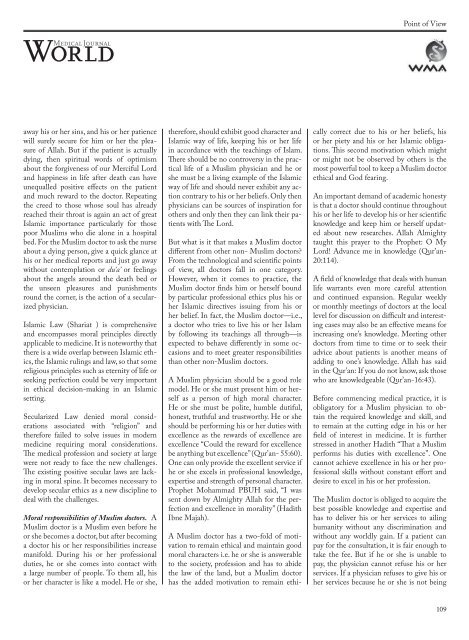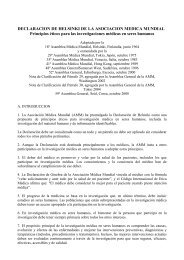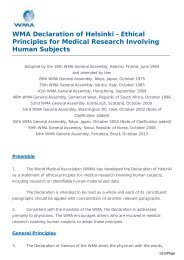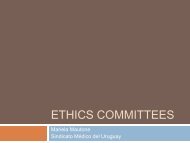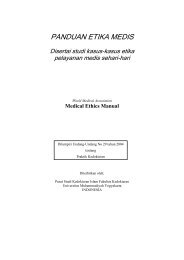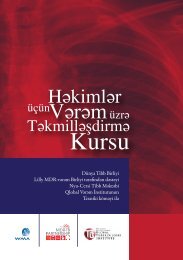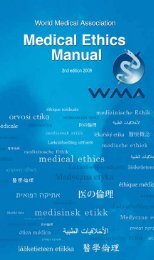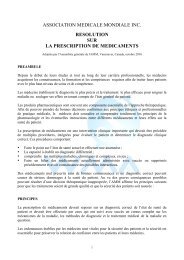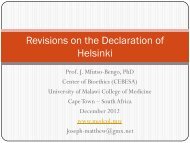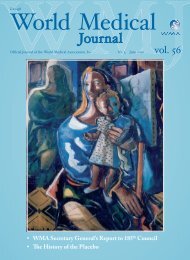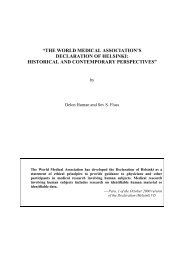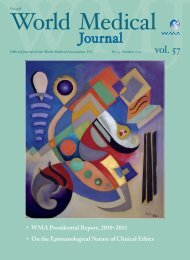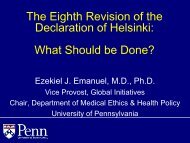wma 7-2.indd - World Medical Association
wma 7-2.indd - World Medical Association
wma 7-2.indd - World Medical Association
Create successful ePaper yourself
Turn your PDF publications into a flip-book with our unique Google optimized e-Paper software.
Point of View<br />
away his or her sins, and his or her patience<br />
will surely secure for him or her the pleasure<br />
of Allah. But if the patient is actually<br />
dying, then spiritual words of optimism<br />
about the forgiveness of our Merciful Lord<br />
and happiness in life after death can have<br />
unequalled positive effects on the patient<br />
and much reward to the doctor. Repeating<br />
the creed to those whose soul has already<br />
reached their throat is again an act of great<br />
Islamic importance particularly for those<br />
poor Muslims who die alone in a hospital<br />
bed. For the Muslim doctor to ask the nurse<br />
about a dying person, give a quick glance at<br />
his or her medical reports and just go away<br />
without contemplation or du’a’ or feelings<br />
about the angels around the death bed or<br />
the unseen pleasures and punishments<br />
round the corner, is the action of a secularized<br />
physician.<br />
Islamic Law (Shariat ) is comprehensive<br />
and encompasses moral principles directly<br />
applicable to medicine. It is noteworthy that<br />
there is a wide overlap between Islamic ethics,<br />
the Islamic rulings and law, so that some<br />
religious principles such as eternity of life or<br />
seeking perfection could be very important<br />
in ethical decision-making in an Islamic<br />
setting.<br />
Secularized Law denied moral considerations<br />
associated with “religion” and<br />
therefore failed to solve issues in modern<br />
medicine requiring moral considerations.<br />
The medical profession and society at large<br />
were not ready to face the new challenges.<br />
The existing positive secular laws are lacking<br />
in moral spine. It becomes necessary to<br />
develop secular ethics as a new discipline to<br />
deal with the challenges.<br />
Moral responsibilities of Muslim doctors. A<br />
Muslim doctor is a Muslim even before he<br />
or she becomes a doctor, but after becoming<br />
a doctor his or her responsibilities increase<br />
manifold. During his or her professional<br />
duties, he or she comes into contact with<br />
a large number of people. To them all, his<br />
or her character is like a model. He or she,<br />
therefore, should exhibit good character and<br />
Islamic way of life, keeping his or her life<br />
in accordance with the teachings of Islam.<br />
There should be no controversy in the practical<br />
life of a Muslim physician and he or<br />
she must be a living example of the Islamic<br />
way of life and should never exhibit any action<br />
contrary to his or her beliefs. Only then<br />
physicians can be sources of inspiration for<br />
others and only then they can link their patients<br />
with The Lord.<br />
But what is it that makes a Muslim doctor<br />
different from other non- Muslim doctors?<br />
From the technological and scientific points<br />
of view, all doctors fall in one category.<br />
However, when it comes to practice, the<br />
Muslim doctor finds him or herself bound<br />
by particular professional ethics plus his or<br />
her Islamic directives issuing from his or<br />
her belief. In fact, the Muslim doctor—i.e.,<br />
a doctor who tries to live his or her Islam<br />
by following its teachings all through—is<br />
expected to behave differently in some occasions<br />
and to meet greater responsibilities<br />
than other non-Muslim doctors.<br />
A Muslim physician should be a good role<br />
model. He or she must present him or herself<br />
as a person of high moral character.<br />
He or she must be polite, humble dutiful,<br />
honest, truthful and trustworthy. He or she<br />
should be performing his or her duties with<br />
excellence as the rewards of excellence are<br />
excellence “Could the reward for excellence<br />
be anything but excellence” (Qur’an- 55:60).<br />
One can only provide the excellent service if<br />
he or she excels in professional knowledge,<br />
expertise and strength of personal character.<br />
Prophet Mohammad PBUH said, “I was<br />
sent down by Almighty Allah for the perfection<br />
and excellence in morality” (Hadith<br />
Ibne Majah).<br />
A Muslim doctor has a two-fold of motivation<br />
to remain ethical and maintain good<br />
moral characters i.e. he or she is answerable<br />
to the society, profession and has to abide<br />
the law of the land, but a Muslim doctor<br />
has the added motivation to remain ethically<br />
correct due to his or her beliefs, his<br />
or her piety and his or her Islamic obligations.<br />
This second motivation which might<br />
or might not be observed by others is the<br />
most powerful tool to keep a Muslim doctor<br />
ethical and God fearing.<br />
An important demand of academic honesty<br />
is that a doctor should continue throughout<br />
his or her life to develop his or her scientific<br />
knowledge and keep him or herself updated<br />
about new researches. Allah Almighty<br />
taught this prayer to the Prophet: O My<br />
Lord! Advance me in knowledge (Qur’an-<br />
20:114).<br />
A field of knowledge that deals with human<br />
life warrants even more careful attention<br />
and continued expansion. Regular weekly<br />
or monthly meetings of doctors at the local<br />
level for discussion on difficult and interesting<br />
cases may also be an effective means for<br />
increasing one’s knowledge. Meeting other<br />
doctors from time to time or to seek their<br />
advice about patients is another means of<br />
adding to one’s knowledge. Allah has said<br />
in the Qur’an: If you do not know, ask those<br />
who are knowledgeable (Qur’an-16:43).<br />
Before commencing medical practice, it is<br />
obligatory for a Muslim physician to obtain<br />
the required knowledge and skill, and<br />
to remain at the cutting edge in his or her<br />
field of interest in medicine. It is further<br />
stressed in another Hadith “That a Muslim<br />
performs his duties with excellence”. One<br />
cannot achieve excellence in his or her professional<br />
skills without constant effort and<br />
desire to excel in his or her profession.<br />
The Muslim doctor is obliged to acquire the<br />
best possible knowledge and expertise and<br />
has to deliver his or her services to ailing<br />
humanity without any discrimination and<br />
without any worldly gain. If a patient can<br />
pay for the consultation, it is fair enough to<br />
take the fee. But if he or she is unable to<br />
pay, the physician cannot refuse his or her<br />
services. If a physician refuses to give his or<br />
her services because he or she is not being<br />
109


